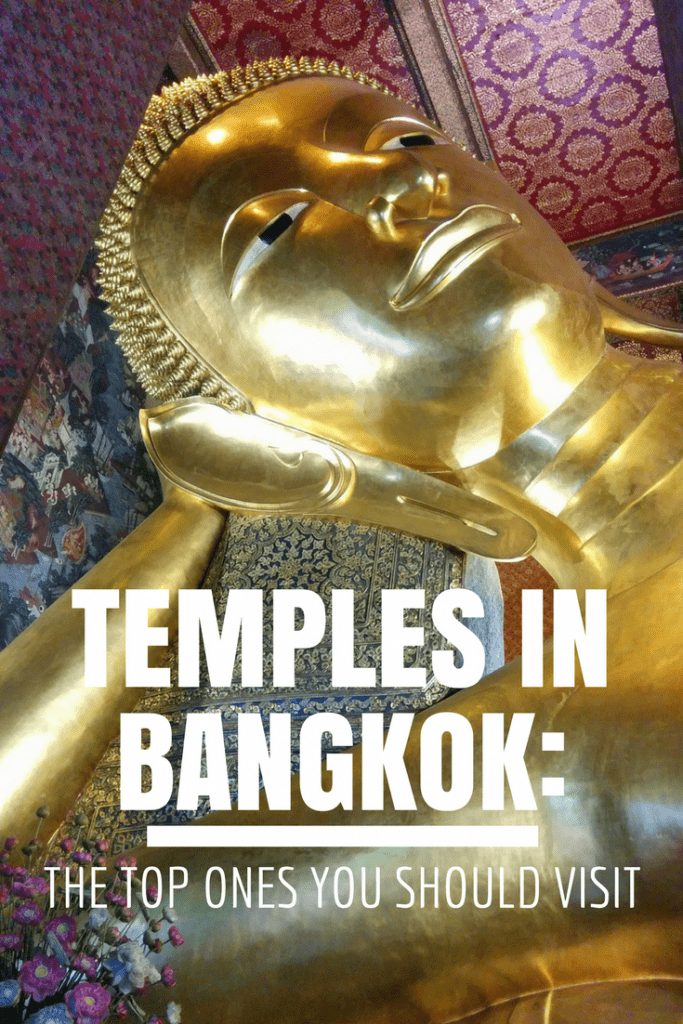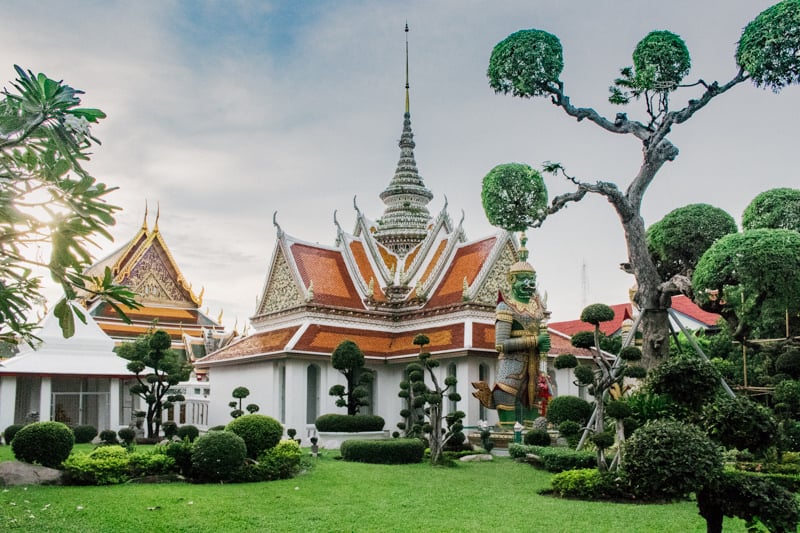Contents
The top temples in Bangkok
Wat Phra Kaew
Nestled inside the luxurious Grand Palace is Wat Phra Kaew. The palace was built in 1782 during the reign of King Rama I. It was strategically placed along the river to help defend against possible invasions, though it was not completed until the late 1800s. Although it is a royal palace, no member of the monarchy has lived here since 1925.
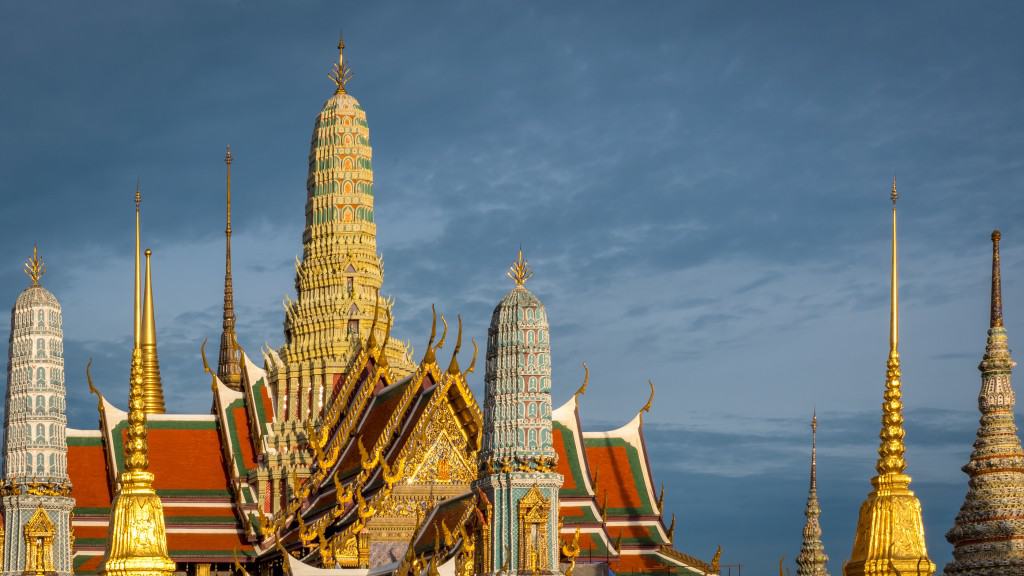
The temple is also known as the Temple of the Emerald Buddha. Wat Phra Kaew was named this because it houses the renowned Emerald Buddha, one of the most highly revered structures in all of Thailand. It is found in the ubosot, or ordination hall and is adorned with pure gold clothing. Though it is called the Emerald Buddha, it is believed that the statue was actually carved from a single block of jade.
The palace in which the temple and the Emerald Buddha reside is split up into three sections. Wat Phra Kaew is found in the outer court, though all are worth exploring. About eight million tourists visit both the palace and the temple each year, so be sure to add this stunning religious structure to your itinerary while travelling in Bangkok.
Mad Monkey tip: Wat Phra Kaew is the most strict of all the temples on our list in terms of clothing. Be sure to cover your shoulders, chest, and ankles when visiting.
Location: Found inside of the Grand Palace
Fees: ฿500 (approximately $15.50)
Hours: Daily from 8:30 a.m. until 3:30 p.m.
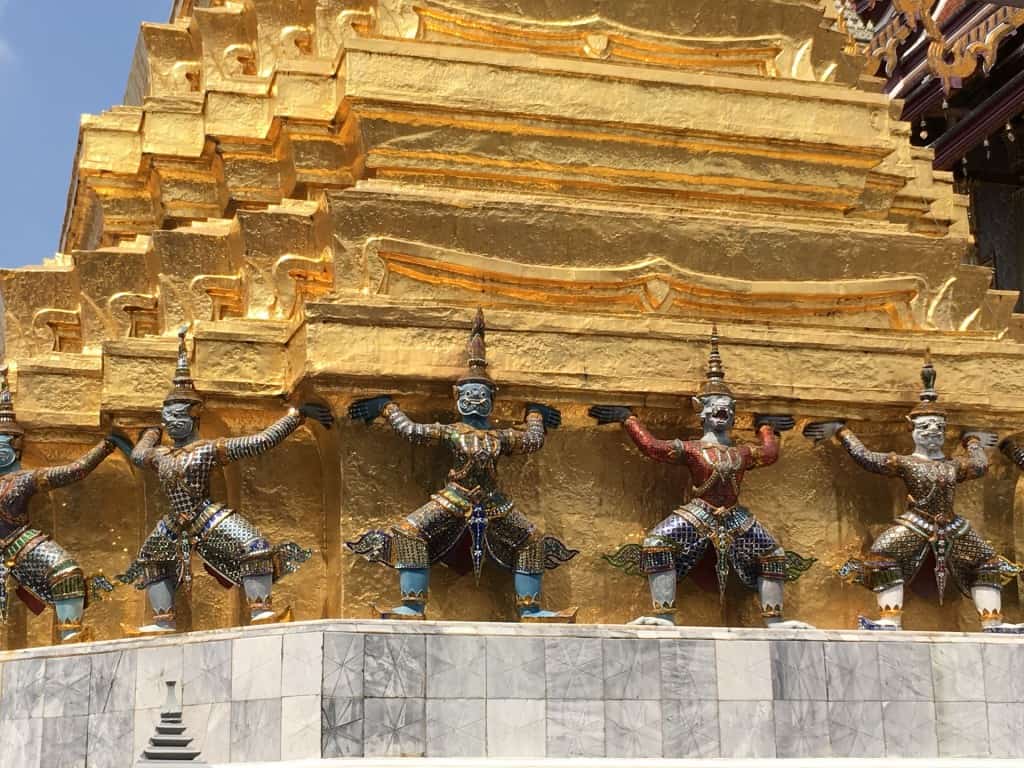
The top temples in Bangkok
Wat Pho
Arguably Bangkok’s most famous temples is Wat Pho. It is home to the giant reclining Buddha, which is why it is referred to as the Temple of the Reclining Buddha. The temple is both the oldest and largest one in the city, and visitors simply flock to see what all the hype behind this amazing structure is all about. The giant Buddha that sits at the temple’s core sits at about 15 metres high and is 46 metres long, and it is covered in gold leaf. The reclining Buddha was built in 1848 and is the largest one in the country.
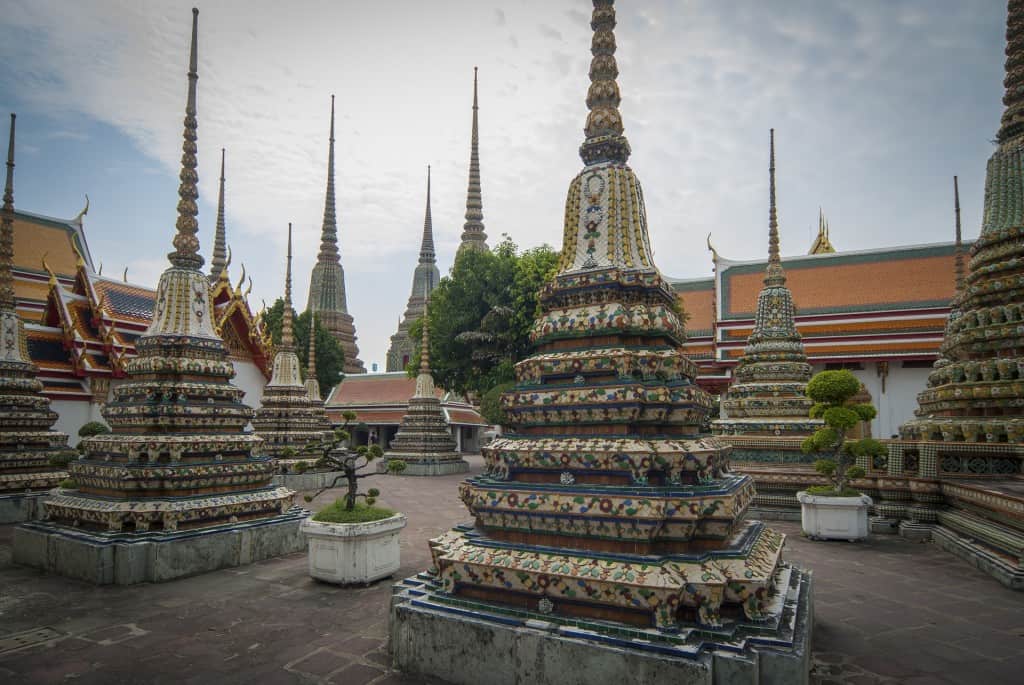
The temple was built in 1782 during the reign of King Rama I. It went under construction again later in 1788, and much of the temple reflects Ayutthaya-style architecture. In addition to the giant Buddha, the temple is also home to one of the old massage schools in Bangkok.
Mad Monkey tip: Wat Pho is a short walk from Wat Phra Kaew and the Grand Palace, so be sure to visit both of these in a single day to make the most out of your temple exploration in the capital.
Location: On Sanam Chai Road and Maharaj Road next to the Grand Palace in Old City
Fees: ฿100 (approximately $3.10)
Hours: Daily from 8 a.m. until 6:30 p.m.
The top temples in Bangkok
Wat Arun
The Chao Phraya River, which is some 230 miles in length, is adorned with interesting and cultural finds all along its banks. One of the most memorable of them all is Wat Arun. It is one of the city’s most photographed attractions and was built sometime during the Ayutthaya period. The Khmer-style Buddhist temple was also known as both Wat Chaeng and Wat Makok before being dubbed its final name of Wat Arun by General Taksin. He named it this because he and his fleet came upon the temple at dawn when they were on their way to fight off Burmese invaders. They saw the temple along the river at dawn and said it was simply glowing, hence its name: the Temple of the Dawn.
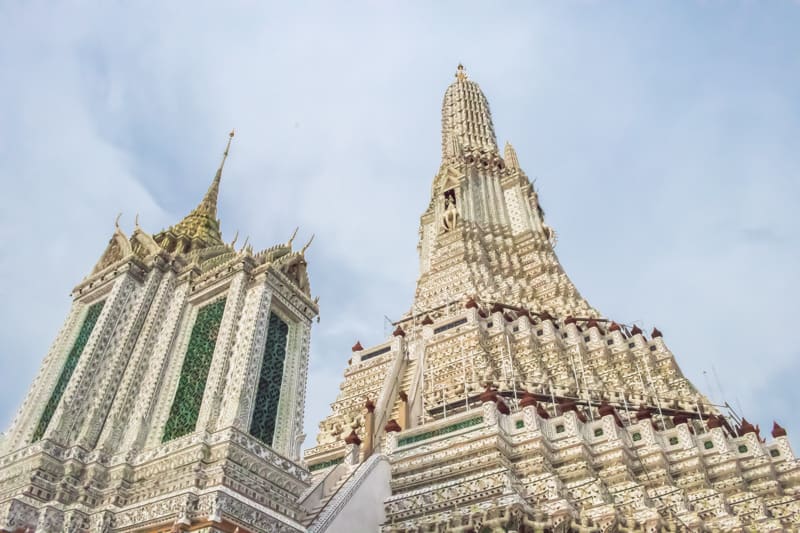
The main central prang of the temple stands about 80 metres tall and is dedicated to Phra Phai, the wind god. Four smaller prangs surround the exterior of the main one, and visitors are allowed to meander about the colourful and stunning grounds, most of which were constructed using foliage-inspired mosaic tiles. The temple is beautiful during the day but arguably more stunning at night, when it lights up and looks gold in colour.
Mad Monkey tip: For those of you wanting to get an even more unique perspective of Wat Arun, Arun Residence is a delicious restaurant in which to visit and watch the sun go down over the majestic temple, as well. It sits just across the river.
Location: Found across the river from Wat Pho on the western banks of the Chao Phraya River
Fees: ฿50 (approximately $1.50)
Hours: Daily from 8 a.m. to 5:30 p.m.
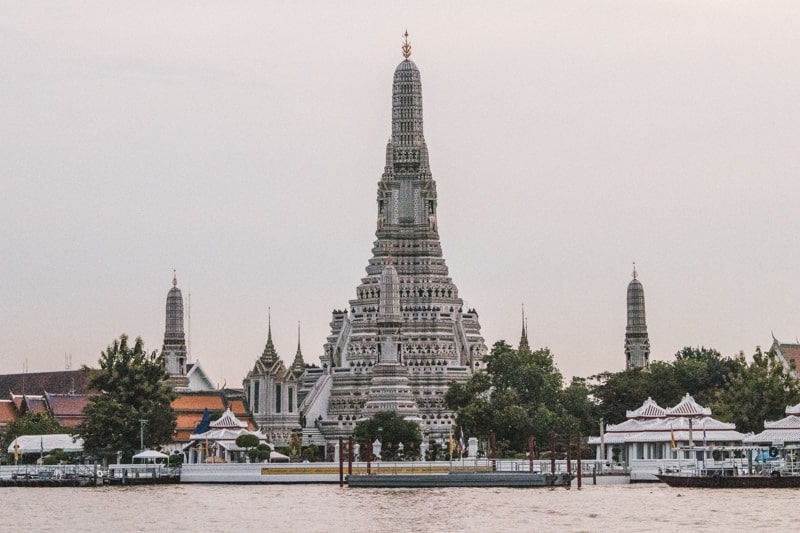
The top temples in Bangkok
Wat Suthat
Wat Suthat is one of Bangkok’s most memorable temples. It is home to the giant red swing that sits just outside of its grand entrance. The temple is also known as Wat Suthat Thepwararam, and it is found in Bangkok’s Old City. Construction of the main and meeting halls of the temple began in 1807 and was completed shortly afterwards under the reign of King Rama I. The giant red swing, as its name suggests, stands at over 21 meters tall.
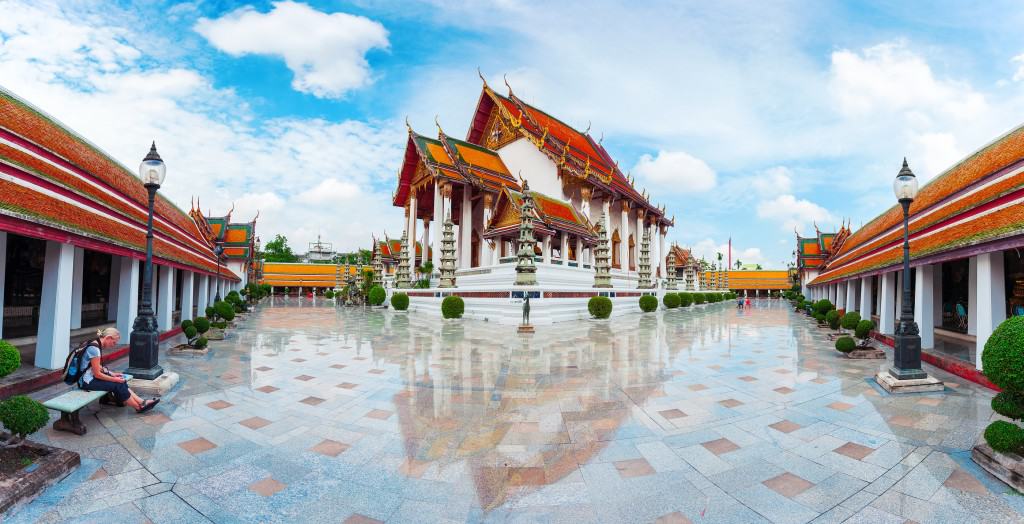
Though it is no longer used today, the swing was once the centrepiece of the Brahman Festival that took place at this temple. In the festival, men would gather to use the teak poles as a human slingshot of sorts, shooting their bodies as far as they could in hopes of reaching a bag of gold coins that was suspended at the top. The gold coins, however, hung some 15 metres in the air, and it was almost impossible to reach them. Under the reign of King Rama VII, the rite was cancelled in 1935 as it resulted in many injuries, and, in some unfortunate cases, deaths. The swing still stands today, though it has been replaced a few times since these rituals took place. The newest addition was built in 2004.
Mad Monkey tip: Wat Suthat is but a 20-minute walk from Mad Monkey Bangkok. Along the way, you will pass a number of noteworthy sites, including Democracy Monument.
Location: On Bamrung Muang Road near Democracy Monument
Fees: ฿20 (about $0.60)
Hours: Daily from 8:30 a.m. until 9 p.m.
The top temples in Bangkok
Wat Traimit
Wat Traimit, home to the world’s largest, solid gold Buddha, is also known as the Temple of the Golden Buddha. The Sukhothai-style Buddha is about three metres tall and weighs almost six tons. It was not housed in Wat Traimit until the 1930s, and it is estimated that the statue is worth more than $250 million
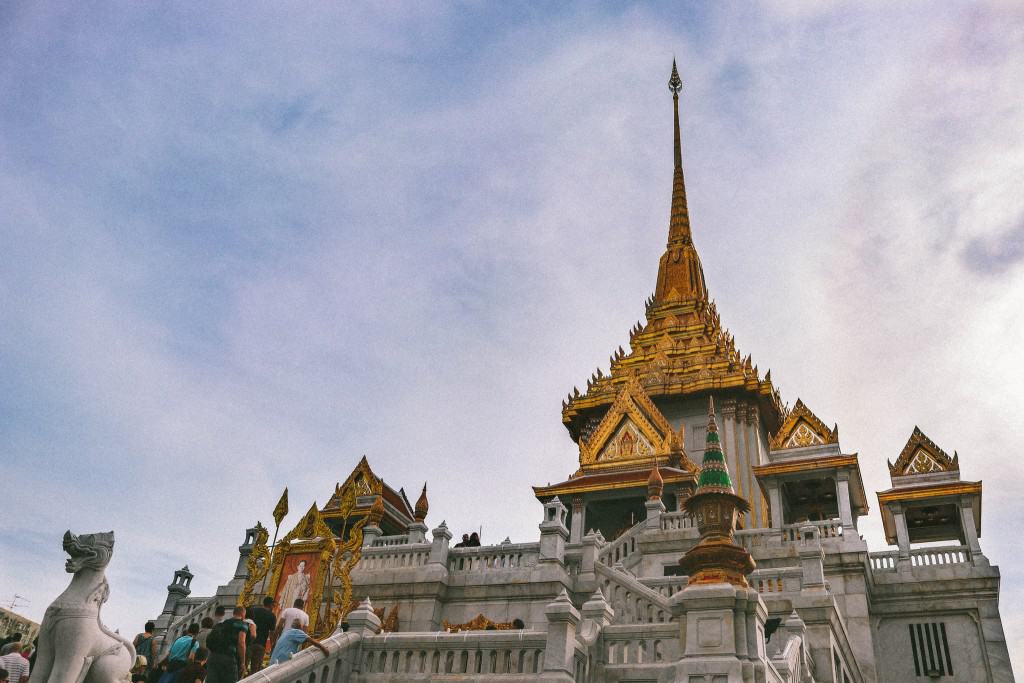
The temple sits at the very beginning of Yaowarat Road, the main stretch of street that occupies the infamous Chinatown. It is mostly white and gold in colour and is just as spectacular on its exterior as its interior. After exploring the stunning temple, be sure to head further into Chinatown. This is where you can sample some of the world-renowned food vendors lining the bustling sois (streets).
Mad Monkey tip: Wat Traimit also houses the Yaowarat Chinatown Heritage Center and the Phra Buddha Maha Suwanna Patimakorn Exhibition. These cultural exhibitions are both worth visiting in addition to seeing the giant golden Buddha.
Location: On Tri Mit Road in Chinatown
Fees: ฿100 (approximately $3.10) for the museum, ฿40 (approximately $1.30) to see the Golden Buddha
Hours: Tuesday through Sunday (closed on Mondays) from 8 a.m. until 5 p.m.
The top temples in Bangkok
Wat Saket
Providing visitors with some of the most panoramic views in town is Wat Saket, otherwise known as the Temple of the Golden Mount. If you did not already guess it, there is a large golden mount that sits atop this towering temple.
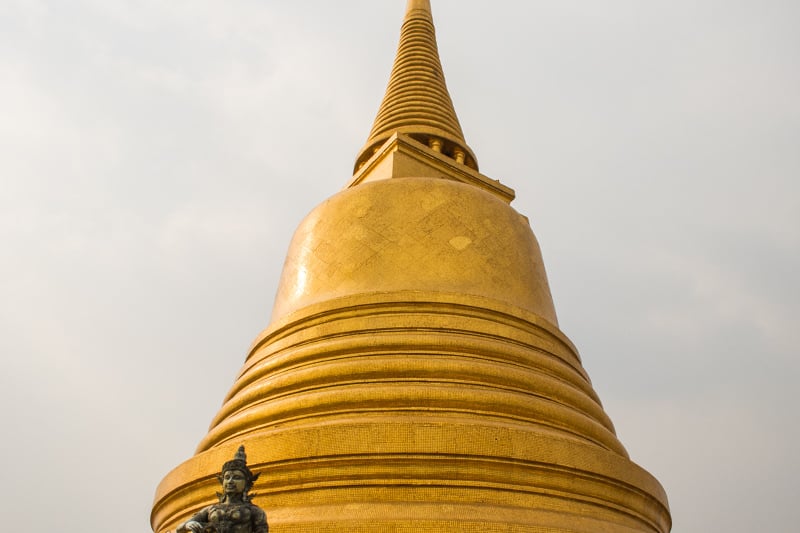
Found on a large artificial hill, visitors must first climb 320 steps to reach the top of the temple, but it is certainly worth the climb. Visitors will find many Buddhist paintings, a library, and a chapel on the grounds of this majestic temple. Strangely and sadly enough, the temple used to serve as a crematorium. About 60,000 victims of cholera were laid to rest here. This explains the small burial site you will come across as you make your way to the top of the temple.
Mad Monkey tip: Wat Saket neighbours Mahakan Fort, one of two forts that are still on the banks of the Chao Phraya River. Be sure to check these out while you are in the neighbourhood!
Location: Off Chakkraphatdiphong Alley
Fees: ฿20 (about $0.60)
Hours: Daily from 8 a.m. to 5 p.m.
The top temples in Bangkok
Wat Ratchanatdaram
Drawing upon Sri Lankan and Indian roots are the temple of Wat Ratchanatdaram. It was built for King Rama III in the 1840s, and, luckily for visitors, it remains a bit off the beaten path in terms of the top temples in which to visit. This temple is also home to Loha Prasat Temple, which is equally if not more stunning than Wat Ratchanatdaram. It was built in 1846 during the reign of King Rama III.
Mad Monkey tip: In addition to the second temple, there is also a quaint coffee shop found on the grounds of Wat Ratchanatdaram. Be sure to stop here and get your caffeine fix before continuing your exploration of Bangkok’s temples.
Location: Found on Soi Damnoen Klang Tai and Mahachai Road
Fees: Free
Hours: Daily from 8 a.m. to 5 p.m.
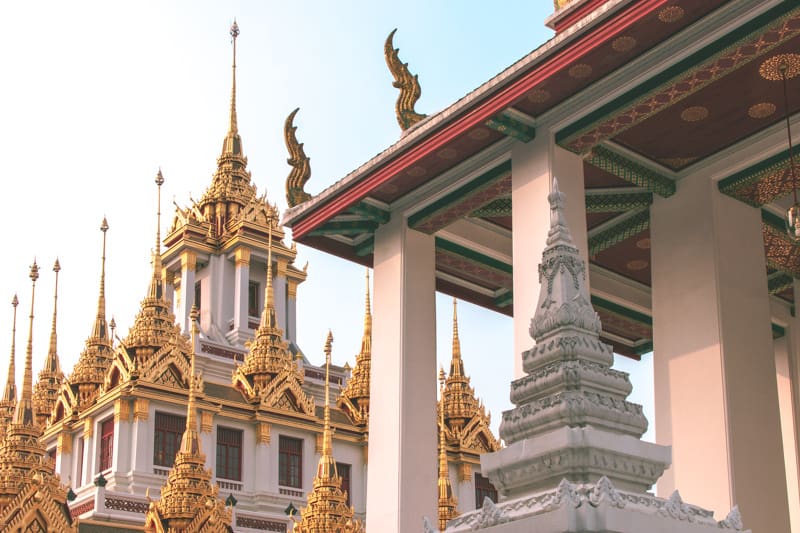
Mad Monkey temple tips
- Bring clothing that is breathable but will also cover your shoulders, chest, knees, and in some cases, your ankles. Otherwise, you may be denied entry into a temple.
- If a tuk-tuk or taxi driver tells you a temple is closed when you are trying to visit but offer to take you to another attraction, it is likely a scam. Kindly decline and continue on your way.
- Temples are constantly under construction, so try to check online before visiting one and being let down by loads of scaffolding surrounding a religious structure.
More information about the top temples in Bangkok
If this article about temples in Bangkok got you excited and you are keen to discover more, check out these links we have rounded up that unveil some of the coolest temples in the capital. We only recommend blogs that we read and use ourselves, as well.
- 10 Must-See Temples in Bangkok for Bangkok.com
- 6 Must-See Temples in Bangkok, Thailand by Kelly Iverson for Culture Trip
- Temples of Bangkok for Lonely Planet
- 7 best temples to visit in Bangkok by CNN travel staff for CNN
- The 10 Best Bangkok Temples by a staff writer for What’s On Sukhumvit
Pin Now, Read Later:
